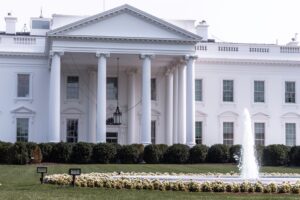by Michael Cooper-White, the Gettysburg Times
Two dozen area residents spent Saturday at the Gettysburg library engaged in efforts to help “depolarize” American society.
Facilitated by two members of a new national organization called Better Angels, the all-day workshop engaged participants in intense dialogue with one another across the political divide that many observers say is wide and worsening.
In his opening comments, the workshop co-moderator, Tom Smerling of Chevy Chase, Md., spoke of the significance of doing this workshop in the town that experienced some of the fiercest fighting of the Civil War. He echoed many historians’ and political commentators’ assessment that our nation is the most divided since that era of deep internal strife.
During a post-workshop reception, Smerling cited surveys that indicate 40-50 percent of U.S. citizens now would have serious reservations if their child proposes marriage to a person of the opposite political party.
“Just a few decades ago, those levels were four to five percent,” he said.
Smerling is no neophyte to helping groups in deep conflict, having spent years facilitating peacemaking dialogues between Israelis and Palestinians. He and his co-facilitator, Reena Bernards, a family therapist also from Chevy Chase, commented on how impressed they were with the Gettysburg participants.
“This has been better than any group we’ve worked with,” the two stated in closing remarks on the rainy afternoon in downtown Gettysburg. They affirmed the participants’ ability to listen to one another and be self-critical. “And this is particularly good in preparing you for Thanksgiving dinner conversations!” quipped Smerling.
Sixteen local citizens were self-identified as “red” or “blue” in their politicalleanings. Bearing color coded nametags, the workshop participants began the day in their eight-member separategroups discussing perceptions they felt the other side held about them.
Each group then summarized how its members feel that stereotypes like “Republicans are narrow minded gun-lovers who are racist and hate poor people” or “Democrats are unpatriotic naive do gooders who border on being socialists or communists” are mistaken. They went on to share forthrightly the degree to which there also may be a kernel of truth in broad generalizations opposing party members ascribe to them.
Following lunch, the red and blue groups took turns in a “fishbowl” exercise where they shared how they believe their side’s values and policies are good for the country, and what reservations they might have about their own party. After the fishbowl session, the groups alternated in sharing what they learned about the other side’s views and where they may find common ground.
As the day concluded, the workshop participants expressed how they felt about their conversations. The two overarching themes that emerged in the round-robin summation were, “I’m more hopeful” and “we have more in common than I realized.”
During the wrap-up session, Scott Smelser offered his perspective that, “Our country would be in better shape if more of us could listen and be respectful.”
Acknowledging that Adams County appears red on maps designating political party affiliation, Mark Greenhouse spoke of the importance of “giving voice to both sides” and avoiding dismissive attitudes toward “the blues who are in the minority.”
The Rev. Herbert Sprouse, rector at Prince of Peace Episcopal Church, which hosted a post workshop reception for the participants, said, “My hope is increased in all of us spending this day together working on important tasks.”
Injecting a lighter note into the room, participant Nancy Lilley sparked laughter when she said of the day’s events, “It’s been the best time I’ve ever had with reds and blues!”
In addition to the 16 red- or blue-leaning dialogue participants seated around a table in the library’s Eisenhower Room, 10 local area “observers” sat in an outer circle and just listened to the spirited conversations. Their only opportunity to speak came at day’s end when they were invited to share their observations of the process.
Gettysburg Area High School ninth grader Anne Bair was among the observers. “I’m grateful I was invited, and thankful to hear this respectful dialogue,” she said, indicating hopes to engage with her peers in similar conversations about controversial issues.
Another observer, Mount Saint Mary’s University Professor Athar Rafiq, a native of Pakistan who has studiedand lived in many countriesaround the world,spoke of the dialogue process as being “a very American grassroots model.”
Convinced that widespread societal change comes about through such local initiatives as Saturday’s event, Rafiq also praised the participants’ commitment to respectful dialogue. “When a group can be self-critical, you can feel it in the room,” he said.
Looking to the future, Smerling and Bernards said Better Angels’ goal is to develop “alliances,” groups of local citizens who “want to keep the conversation going” and expand the number of people committed to “find common ground.” Such alliances, they explained, must have red and blue co-chairs and maintain at least a 60/40 balance in their membership to ensure that bridge-building takes place and one side cannot dominate conversations.
Currently active in 30 states, Better Angels expects to have a toehold nationwide within a year. New York-based, it describes itself as “an organization uniting red and blue Americans in a working alliance to depolarize America.” Membership costs $10 per year. For more information, visit braverangels.org.
This article originally appeared here.



